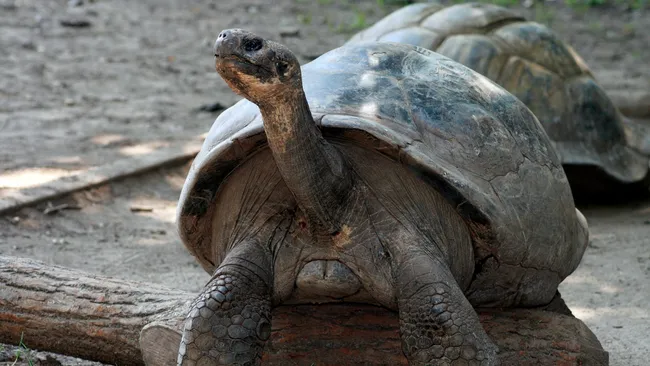A roughly 100-year-old western Santa Cruz Galápagos tortoise has become a mom for the first time after reproducing with a male of the same age at Philadelphia Zoo.
An endangered giant tortoise has made history as the oldest first-time mother of her species, giving birth to her first offspring at around 100 years old.
Philadelphia Zoo recently celebrated the hatching of eggs laid by a senior western Santa Cruz Galápagos tortoise, known as Mommy. Although her exact age is unknown, Mommy has been at the zoo for over 90 years.
The western Santa Cruz Galápagos tortoises are critically endangered in their natural habitat, the Galápagos Islands, and there are fewer than 50 of them in U.S. zoos. This marks the first time that Philadelphia Zoo has successfully hatched western Santa Cruz Galápagos tortoises in its long history of over 150 years, according to a statement from the zoo.
“This is a major milestone for Philadelphia Zoo, and we are thrilled to share this incredible news with our community and the world,” said Jo-Elle Mogerman, president and CEO of the Philadelphia Zoo. “Mommy arrived at the Zoo in 1932, so anyone who has visited over the last 92 years has likely seen her.”
Western Santa Cruz Galápagos tortoises are a subspecies of the famous Galápagos tortoises and are the largest tortoises on Earth. Male tortoises can grow up to 1.8 meters (6 feet) long and weigh around 570 pounds (260 kilograms), according to the San Diego Zoo Wildlife Alliance.
Human activity has drastically reduced tortoise populations on the Galápagos Islands, pushing the western Santa Cruz Galápagos tortoises to the edge of extinction. Historically, sailors hunted them for meat, and habitat destruction, alongside invasive species like goats and predators such as rats and cats, has further threatened their survival, according to the International Union for Conservation of Nature.
Mommy is part of a breeding program aimed at preserving this subspecies. She successfully reproduced for the first time with a male named Abrazzo, who is also around 100 years old. Abrazzo joined the Philadelphia Zoo in 2020 after living at the Riverbanks Zoo and Garden in South Carolina, where he contributed to successful breeding efforts in 2019.
Tortoises and other reptiles can continue reproducing throughout their lives once they reach maturity, so it’s not unusual for them to breed well into old age. Although the maximum lifespan of Galápagos tortoises is unknown, one individual was recorded to have lived to 171 years, according to the San Diego Zoo Wildlife Alliance.
Mommy laid 16 eggs in November 2024, which were then placed in an artificial incubator. The sex of Galápagos tortoise hatchlings depends on the temperature during incubation: temperatures below 82.4°F (28°C) produce males, while temperatures above 85.1°F (29.5°C) produce females. The zoo incubated half of the eggs at the male temperature and half at the female temperature, though only female hatchlings have emerged so far.
Ashley Ortega, coordinator for the captive Galápagos tortoise Species Survival Plan at Gladys Porter Zoo in Texas, expressed excitement about the new arrivals. She highlighted how extraordinary it was for Mommy to become the oldest first-time mother of her species, making the achievement even more remarkable.
“Before these hatchlings, there were only 44 western Santa Cruz Galápagos tortoises in U.S. zoos combined,” Ortega said. “These new additions represent a fresh genetic lineage and are crucial for the species’ survival. We’re excited to see how we can replicate this success at other accredited zoos, as the team in Philadelphia has accomplished something once thought impossible.”
